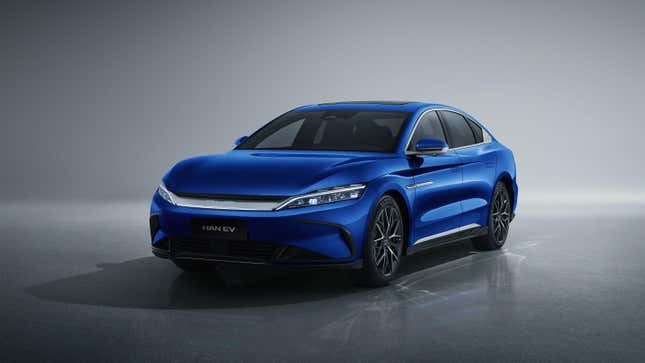
There are no cheap EVs. Well there aren’t any for now. Volvo’s EX30 is a start, but factoring in destination charges and other things like color choice, the most basic version will still essentially be $40,000. Chevy’s Bolt may come back, and there is still the Nissan Leaf. Other than those few there are hardly any new EVs under $40,000. And according to Automotive News, China’s BYD wants you to thank the Inflation Reduction Act for that.
At least that’s according to BYD’s Stella Li who’s spearheading the company’s efforts to go global. She says that the U.S. isn’t “under our current consideration” because of the Inflation Reduction Act. Simply put, the IRA is too U.S.-centric and doesn’t make doing business in the U.S. financially feasible. In an interview with Automotive News she mentioned how she thinks the IRA will keep Americans from affordable EVs.
We need to make sure with each step, we can be successful,” Li, executive vice president, said in an interview. “I strongly believe that the IRA may slow down EV adoption in the U.S.,” she said, noting that American consumers won’t be able to access the most “affordable” options.
BYD is huge in the EV market, with sales expected to hit 2.7 million units this year. That’s due in large part to the company’s ability to make cheap EVs that are accessible to more people. Automotive News notes many of their models start in the $15,000-$45,000 range. But Li is conveniently leaving out the reason BYD can sell its EVs for so cheap: in-house battery production.
Part of why BYD can sell its EVs for so much less is because of its stronghold in batteries. Apart from being an auto supplier, the company also is the world’s second-largest battery maker. China completely dominates when it comes to the supply chain for the lithium that’s needed for EV batteries, and while there are initial plans to boost U.S. production, all of that is still far down the line.
The problem of selling cheap EVs in the U.S. comes down to the lack of a battery infrastructure, and the ability to source lithium for batteries (which again the U.S. hasn’t been able to get a handle on.)
While the U.S. is home to the world’s fifth largest lithium reserves, it’s going to take years to build out a supply chain that both mines and processes the mineral for battery manufacturing. Honestly, it’s slow to start. Until all of that is organized and fixed, we’ll just have to sit back and watch the rest of world outpace the U.S. in EV adoption, all because the “future” of vehicles are still priced out of reach for most Americans.